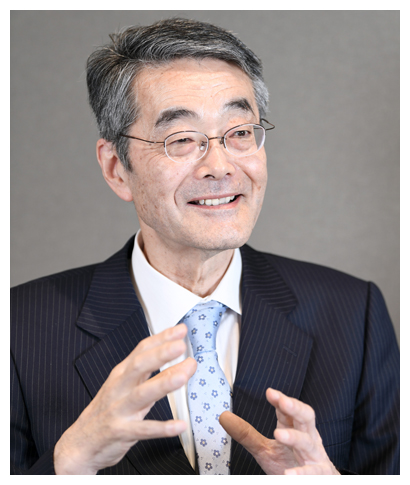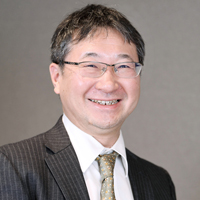Aug. 7, 2025 Perspectives Other
Protecting the health of people and the planet
Interview with Kazuki Saito, Executive Director of Science, Sustainability Science Domain
To leverage RIKEN’s comprehensive capabilities and to conduct more effective management with a stronger strategic focus, a new system was introduced in fiscal year 2025. It consists of five research domains—Pioneering Science; Mathematical, Computational and Information Science; Life Science; Sustainable Science; and Physical Science. Each research domain is led by an Executive Director of Science, an internationally outstanding scientist who possesses extremely high expertise both academically and in research management. These Executive Directors of Science encourage cross-disciplinary collaboration based on advanced specialized knowledge, accelerating the creation of new knowledge. Supporting research promotion alongside the five Executive Directors of Science are the Promotion Division Directors.
We asked about the goals of each domain from both researchers’ and administrative departments’ perspectives.
- Sustainability Science Domain
- This domain aims to build a sustainable society by safeguarding the global commons and achieving both human and planetary health. Its research focuses on the development of biological resources and bioproduction, material circulation, and symbiosis with the environment.

Kazuki Saito
Executive Director of Science, Sustainability Science Domain
As human activities have grown to an unprecedented scale, the Earth is now approaching or even exceeding several of the thresholds known as "planetary boundaries." Planetary boundaries refer to the limits that humanity must not surpass in order to sustainably survive on Earth. If current trends continue, it will become increasingly difficult to maintain the health and survival of both the planet and humankind.
Our mission in the field of sustainability science is to harness the power of science and technology to protect the global commons—Earth’s systems shared by all of humanity—and to achieve a balance between the health of people and the planet.
Our goal: sustaining sustainability
A defining feature of the sustainability Science Domain is that it not only refers to an academic discipline, but also clearly presents a goal; the maintenance of sustainability. This clarity of purpose allows researchers from diverse specialties to align their efforts toward a common objective, fostering a powerful sense of unity that drives collaborative, interdisciplinary research.
This domain comprises all research groups within the RIKEN Center for Sustainable Resource Science (CSRS) and selected groups within the RIKEN BioResource Research Center (BRC) that focus on plants and microorganisms. Over 30 principal investigators (PIs) lead their respective teams, conducting highly advanced and cutting-edge research.
Our research is centered on plant science, catalytic chemistry, and chemical biology, with a focus on building a sustainable future. Enhancing the productivity and functionality of plants and microorganisms plays a key role in stabilizing our food supply and creating a society with reduced dependence on fossil resources. Meanwhile, the development of highly efficient catalysts and innovative polymer materials contributes to building a resource-circulating society that minimizes consumption and waste. Additionally, by elucidating the symbiotic relationships between plants and microorganisms, we are working toward the low-impact production of agricultural products and useful substances.
One key research theme is the development of plants resistant to environmental changes brought about by climate change. For example, a technique using ethanol treatment to improve drought tolerance has shown promising effects on major crops such as wheat, rice, cassava, tomato, and lettuce, with practical applications expected in the field.
CSRS also boasts world-class research infrastructure, including metabolomics and multi-omics analysis platforms, diversity genome analysis, and a comprehensive compound library. In parallel, BRC contributes its extensive bioresource collections—plants, microorganisms, and more—essential for biodiversity conservation and reliable research, strengthening the overall field.
As the Executive Director of Science of this research domain, I see my role as creating an environment where researchers can fully pursue their intellectual curiosity while ensuring that their scientific achievements ultimately contribute to society. In addition to securing essential resources such as time for research and funding, I also place great importance on promoting active dialogue across disciplines and institutions, both domestically and internationally, to foster new ideas.
For researchers, having their curiosity-driven work recognized is a source of immense satisfaction—but when their research is actually implemented in society to benefit others, I believe that joy is multiplied many times over.
Toward the realization of planetary health
The year 2030—the target set by the United Nations for achieving the SDGs—is fast approaching. In the sustainability Science Domain, we are committed to conducting responsible research that skillfully balances urgent, short-term challenges with long-term research and development that looks 10 or even 20 years into the future.
Our ultimate goal is the realization of "Planetary Health"—a balance between the health of people and the planet. Through this, we aim to protect both human and environmental well-being, build a safer and more equitable society through the power of science, and contribute to paving the way toward a sustainable future.

Ryosuke Maruyama
Division Director, Sustainability Science Promotion Division
In the Sustainability Science Domain, social implementation that leads to real-world solutions is particularly important. To this end, we place strong emphasis on coordination with research institutes in fields such as the humanities, social sciences, and economics, aiming to bridge scientific innovation with societal impact.
Rate this article
